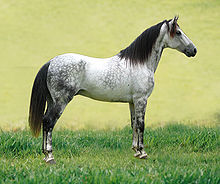Mangalarga Marchador

Mangalarga Marchador
|
|
| Country of origin | Brazil |
|---|---|
| Breed standards | |
The Mangalarga Marchador is a horse breed native to Brazil. There are over 350,000 registered Mangalarga Marchador horses in that country, in addition to those registered abroad. An Iberian breed descended from Portuguese Lusitano stallions and Barb mares, they are valued for their beauty, intelligence, disposition and smooth gaits. Mangalarga Marchadors have four gaits: walk, canter and two natural, ambling gaits—the diagonal batida and the lateral picada. They are noted for their endurance and versatility in a number of disciplines.
The Mangalarga Marchador is a medium-sized breed with a silky coat, prominent withers, deep chest, a proportionately-long back, muscular hindquarters, a sloping croup and hard hoofs. All coat colours are accepted for registration. For stallions the ideal height is 152 centimetres (15.0 hands; 60 in), with a range for registration from 147 centimetres (14.2 hands; 58 in) to 157 centimetres (15.2 hands; 62 in). The ideal height for mares is 146 centimetres (14.1 hands; 57 in), ranging from 140 centimetres (13.3 hands; 55 in) to 154 centimetres (15.1 hands; 61 in).
Its head is triangular in shape with a straight profile, large nostrils, ears pointing slightly inwards and large, expressive eyes. Stallions have a slight crest on their neck.
The breed is smooth-gaited, with two natural intermediate speed ambling gaits, called marcha; the marcha batida, where the feet move diagonally, in a manner similar to a fox trot, and the marcha picada, a four-beat lateral gait, similar to a stepping pace or singlefoot. The picada, which means "light touch" in Portuguese, is usually the smoother of the two, because the lateral movement creates little vertical momentum, and is similar to the paso llano of the Peruvian Paso. Conversely, batida means "to hit", and that gait is similar to the trocha gait of the Paso Fino.
...
Wikipedia
